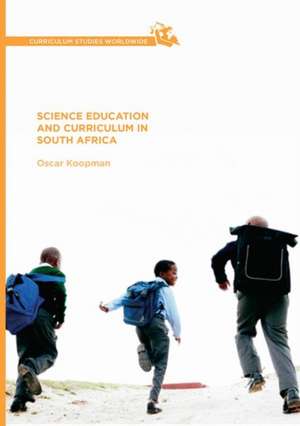Science Education and Curriculum in South Africa: Curriculum Studies Worldwide
Autor Oscar Koopmanen Limba Engleză Paperback – 23 iun 2018
Din seria Curriculum Studies Worldwide
-
 Preț: 331.87 lei
Preț: 331.87 lei -
 Preț: 302.20 lei
Preț: 302.20 lei - 8%
 Preț: 537.66 lei
Preț: 537.66 lei -
 Preț: 299.09 lei
Preț: 299.09 lei -
 Preț: 387.75 lei
Preț: 387.75 lei - 8%
 Preț: 588.90 lei
Preț: 588.90 lei - 15%
 Preț: 587.72 lei
Preț: 587.72 lei -
 Preț: 421.72 lei
Preț: 421.72 lei -
 Preț: 416.92 lei
Preț: 416.92 lei -
 Preț: 451.87 lei
Preț: 451.87 lei - 18%
 Preț: 893.71 lei
Preț: 893.71 lei - 15%
 Preț: 643.65 lei
Preț: 643.65 lei - 15%
 Preț: 584.10 lei
Preț: 584.10 lei - 15%
 Preț: 527.97 lei
Preț: 527.97 lei -
 Preț: 384.48 lei
Preț: 384.48 lei - 18%
 Preț: 945.62 lei
Preț: 945.62 lei - 18%
 Preț: 724.50 lei
Preț: 724.50 lei - 9%
 Preț: 787.57 lei
Preț: 787.57 lei - 18%
 Preț: 730.47 lei
Preț: 730.47 lei
Preț: 176.74 lei
Nou
Puncte Express: 265
Preț estimativ în valută:
33.83€ • 36.76$ • 28.44£
33.83€ • 36.76$ • 28.44£
Carte tipărită la comandă
Livrare economică 21 aprilie-05 mai
Preluare comenzi: 021 569.72.76
Specificații
ISBN-13: 9783319821771
ISBN-10: 3319821776
Pagini: 187
Ilustrații: XIX, 187 p. 5 illus., 2 illus. in color.
Dimensiuni: 148 x 210 mm
Greutate: 0.25 kg
Ediția:Softcover reprint of the original 1st ed. 2017
Editura: Springer International Publishing
Colecția Palgrave Macmillan
Seria Curriculum Studies Worldwide
Locul publicării:Cham, Switzerland
ISBN-10: 3319821776
Pagini: 187
Ilustrații: XIX, 187 p. 5 illus., 2 illus. in color.
Dimensiuni: 148 x 210 mm
Greutate: 0.25 kg
Ediția:Softcover reprint of the original 1st ed. 2017
Editura: Springer International Publishing
Colecția Palgrave Macmillan
Seria Curriculum Studies Worldwide
Locul publicării:Cham, Switzerland
Cuprins
Chapter 1 Phenomenology as a method in education research.- Chapter 2 Physical science: A science for government or a science for life?.- Chapter 3 My becoming and un-becoming: Life as a child, learner and university science student.- Chapter 4 I am ready for this new curriculum: The lived experiences of a Physical Science teacher.- Chapter 5 Do teachers also see what chemists see when they teach chemistry?.- Chapter 6 What can science teachers learn from the wine expert?.- Chapter 7 Harnessing the full use of the senses in the science classroom.- Chapter 8 Can a phenomenological approach enhance learning in science in South Africa?.
Recenzii
Notă biografică
Oscar Koopman is Lecturer in Chemistry at the Cape Peninsula University of Technology, South Africa. Koopman has found his home in phenomenology by exploring what it means to be a science teacher in contemporary South Africa, given the long history of apartheid and apartheid education in the country.
Textul de pe ultima copertă
This book explores the impact of the socio-historical, political, and economic environment in South Africa, both during and after Apartheid. During this time, the South African education system demonstrated an interest in a specific type of knowledge, which Koopman refers to as ‘a science of government’. This ‘science of government’ leaves the learners with a blurred understanding of science that is disconnected from external nature and human nature, and is presented as a series of abstract concepts and definitions. The book also investigates the dialectical tensions between the science curriculum and the role of the teacher as an active implementer of the curriculum. The book draws on the work of various phenomenological scholars, namely Edmund Husserl, Martin Heidegger, Merleau-Ponty, and Max van Manen to discuss these tensions.
Caracteristici
Explores the significance of power in the historical development of physical science curriculum in South Africa Research suggests that Physical Science as a school subject was designed neither to liberate nor to empower the black learner, but that it acted as a form of policing and exercising social control Author uses a phenomenological approach to explore scientific thinking in relation to life experience, learning, and curriculum design
